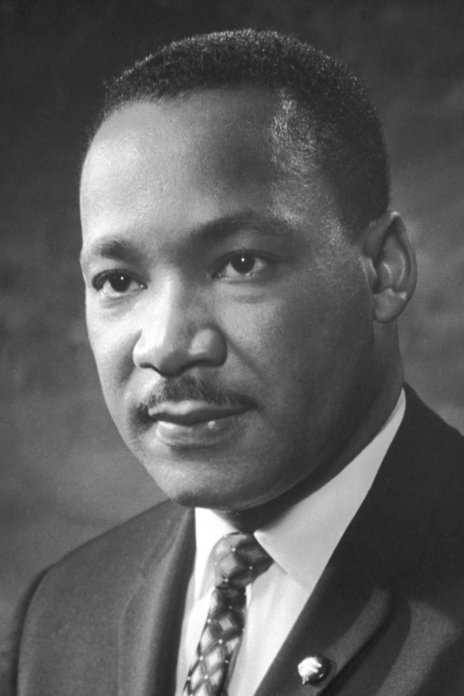Martin Luther King frasi celebri

Martin Luther King Frasi e Citazioni
da La forza di amare
La forza di amare
da La forza di amare
La forza di amare
Il sogno della non violenza
Citazioni di Martin Luther King
p. 234 sg.
Citazioni di Martin Luther King
Origine: Dal discorso al Lincoln Memorial di Washington, 28 agosto 1963; citato in Ferdie Addis, I have a dream. I discorsi che hanno cambiato la storia, traduzione di Valeria Bastia, De Agostini, Novara, 2012, p. 104 http://books.google.it/books?id=obMxU4M4kQ4C&pg=PT104. ISBN 978-88-418-7870-5
“La chiesa […] non è la padrona o la serva dello stato, ma la coscienza dello stato.”
da La forza d'amare
La forza di amare
“La salvezza dell'uomo è nelle mani dei disadattati creativi.”
da La forza d'amare
La forza di amare
“Ignorare il male equivale ad esserne complici.”
da Il sogno della non violenza. Pensieri
Il sogno della non violenza
Citazioni di Martin Luther King
Citazioni di Martin Luther King
Citazioni di Martin Luther King
Origine: Citato in Teresio Bosco, Uomini come noi, Società Editrice Internazionale, Torino, 1968.
“Questo 4 di luglio è vostro, non mio.”
da Il sogno della non violenza. Pensieri
Il sogno della non violenza
Origine: Lettera a un amico antisionista è una lettera aperta erroneamente attribuita a Martin Luther King. Cfr. Letter to an Anti-Zionist Friend.
Origine: Citazioni erroneamente attribuite, p. 234
Origine: Citazioni erroneamente attribuite, p. 234
Citazioni di Martin Luther King
Origine: Da The Words of Martin Luther King Jr., New Market Press, New York, 1983, p. 71; citato in Dennis Dalton, Gandhi, il Mahatma: il potere della nonviolenza, traduzione di Andrea Boni, ECIG, Genova, 1998, p. 13. ISBN 88-7545-842-1
Citazioni di Martin Luther King
Citazioni di Martin Luther King
Citazioni di Martin Luther King
Origine: Citato in AA.VV. 2018, p. 320.
“Cristo ci ha dato gli obiettivi, Mahatma Gandhi la tattica.”
Citazioni di Martin Luther King
Origine: Citato in AA.VV. 2018, p. 225.
Martin Luther King: Frasi in inglese
1960s, Nobel Prize acceptance speech (1964)
Rev. Martin Luther King, Jr., Seventh Annual Gandhi Memorial Lecture, Howard Univ., Washington, D.C. (6 November 1966), quoted in What do the election results mean for the move toward marriage equality? by Evan Wolfson (3 November 2004) http://www.freedomtomarry.org/document.asp?doc_id=2030
1960s
1960s, Why I Am Opposed to the War in Vietnam (1967)
1960s, Emancipation Proclamation Centennial Address (1962)
1960s, (1963)
Tears came into my eyes that at such a tragic moment, my race still could sing its hope and faith.
Interview in Playboy (January 1965) https://web.archive.org/web/20080706183244/http://www.playboy.com/arts-entertainment/features/mlk/04.html
1960s
1960s, Why I Am Opposed to the War in Vietnam (1967)
Rediscovering Lost Values http://mlk-kpp01.stanford.edu/index.php/kingpapers/article/rediscovering_lost_values/, Sermon delivered at Detroit's Second Baptist Church (28 February 1954)
1950s
1950s, Conquering Self-centeredness (1957)
1960s, The Drum Major Instinct (1968)
1960s, A Christmas Sermon (1967)
Rediscovering Lost Values http://mlk-kpp01.stanford.edu/index.php/kingpapers/article/rediscovering_lost_values/, Sermon delivered at Detroit's Second Baptist Church (28 February 1954)
1950s
Contesto: We have adopted in the modern world a sort of a relativistic ethic... Most people can't stand up for their convictions, because the majority of people might not be doing it. See, everybody's not doing it, so it must be wrong. And since everybody is doing it, it must be right. So a sort of numerical interpretation of what's right. But I'm here to say to you this morning that some things are right and some things are wrong. Eternally so, absolutely so. It's wrong to hate. It always has been wrong and it always will be wrong. It's wrong in America, it's wrong in Germany, it's wrong in Russia, it's wrong in China. It was wrong in 2000 B. C., and it's wrong in 1954 A. D. It always has been wrong, and it always will be wrong. It's wrong to throw our lives away in riotous living. No matter if everybody in Detroit is doing it, it's wrong. It always will be wrong, and it always has been wrong. It's wrong in every age and it's wrong in every nation. Some things are right and some things are wrong, no matter if everybody is doing the contrary. Some things in this universe are absolute. The God of the universe has made it so. And so long as we adopt this relative attitude toward right and wrong, we're revolting against the very laws of God himself. [... ] That attitude is destroying the soul of our culture! It's destroying our nation! The thing that we need in the world today is a group of men and women who will stand up for right and to be opposed to wrong, wherever it is. A group of people who have come to see that some things are wrong, whether they're never caught up with. And some things are right, whether nobody sees you doing them or not.
"Keep Moving from this Mountain" http://www5.spelman.edu/about_us/news/pdf/70622_messenger.pdf – Founders Day Address at the Sisters Chapel, Spelman College (11 April 1960)
1960s
1960s, Family Planning - A Special and Urgent Concern (1966)
Interview in Playboy (January 1965) https://web.archive.org/web/20080706183244/http://www.playboy.com/arts-entertainment/features/mlk/04.html
1960s
1960s, (1963)
"Honoring Dr. DuBois", speech at International Cultural Evening at Carnegie Hall, 23 February 1968, published in Freedomways: A Quarterly Review of the Negro Freedom Movement, compiled in Esther Cooper Jackson (ed.), Freedomways Reader: Prophets In Their Own Country, p. 36 https://books.google.com/books?id=-oivNmSJOfAC&pg=PA36&dq=%22the+supreme+task+is+to+organize+and+unite%22
1960s
1960s, Address to Local 815, Teamsters and the Allied Trades Council (1967)
Interview in Playboy (January 1965) https://web.archive.org/web/20080706183244/http://www.playboy.com/arts-entertainment/features/mlk/04.html
1960s
1960s, I've Been to the Mountaintop (1968)
1960s, Why I Am Opposed to the War in Vietnam (1967)
1960s, The Drum Major Instinct (1968)
1960s, Where Do We Go from Here: Chaos or Community? (1967)
1960s, Beyond Vietnam: A Time to Break Silence (1967)
1960s, Why I Am Opposed to the War in Vietnam (1967)
1960s, Beyond Vietnam: A Time to Break Silence (1967)
1960s, How Long, Not Long (1965)
1950s, Three Ways of Meeting Oppression (1958)
1950s, Loving Your Enemies (November 1957)
